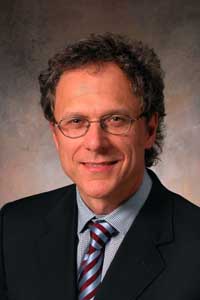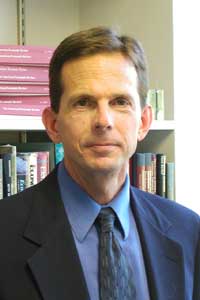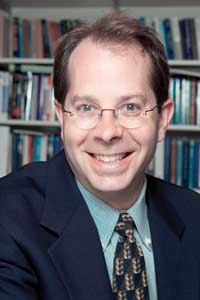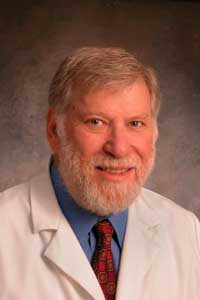University welcomes eight new scholars
By Jessamine Chan, John Easton, William Harms, Seth Sanders, Peter SchulerGraduate School of Business, Medical Center Public Affairs, News Office
Eight distinguished scholars have received faculty appointments at the University this year and have joined their new Chicago colleagues in the Biological Sciences Division, the Humanities Division, the Social Sciences Division, the Graduate School of Business and the Irving B. Harris Graduate School of Public Policy Studies.
The eight new members of the faculty are John Birge, Professor of Operations Management and the Neubauer family faculty fellow in the Graduate School of Business; Judith Farquhar, Professor in Anthropology; Frances Ferguson, the George M. Pullman Professor in English Language & Literature and the College; T. Conrad Gilliam, Professor and Chairman of Human Genetics; Jeffrey Grogger, Professor in the Irving B. Harris Graduate School of Public Policy Studies; Bruce Meyer, the McCormick Tribune Professor in the Irving B. Harris Graduate School of Public Policy Studies; S. Murray Sherman, Professor and Chairman of Neurobiology, Pharmacology and Physiology; and Michael Vannier, Professor in Radiology.
 John Birge | |
Birge’s research interests include mathematical modeling of systems with uncertainty, stochastic programming, and large-scale optimization. His publications include the books Introduction to Stochastic Programming with F.V. Louveaux and Mathematical Programming: State of the Art 1994, edited with K.G. Murty. He has contributed chapters to books, including Numerical Methods in Stochastic Programming and Mathematical Programming for Industrial Engineers, and has published articles in numerous academic journals.
He is a referee for 16 journals and institutions including Mathematical Programming, Operations Research, Management Science, the National Science Foundation and the Canadian Research Council.
From 1993 to 1999, Birge served as chair of industrial and operations engineering at the University of Michigan, and he was chair of financial engineering at the University of Michigan from 1997 to 1999. While at the University of Michigan, he also served as professor of industrial and operations engineering.
Birge earned an A.B. in mathematics from Princeton University in 1977, an M.S. in operations research from Stanford University in 1979, and a Ph.D. in operations research from Stanford University in 1980.
 Judith Farquhar | |
Farquhar currently is doing research on self-care techniques and health attitudes on the part of urbanites in Beijing.
Farquhar is the author of Appetites: Food and Sex in Post-Socialist China, published in 2002. She also wrote Knowing Practice: The Clinical Encounter of Chinese Medicine, published in 1994.
Farquhar is a member of the editorial board of Medical Anthropology, China Review International and Positions: East Asia Cultures Critique. She also co-edits Body, Commodity, Text: Studies in Objectifying Practice, a monograph series, with co-editors Arjun Appadurai, Research Associate in Anthropology, and Jean Comaroff, the Bernard E. & Ellen C. Sunny Distinguished Service Professor in Anthropology.
After studying at Antioch College, Farquhar attended Chicago, where she received an A.M. in the Social Sciences in 1975. She continued her work at the Inter-University Program for Chinese Language Studies in Taiwan and then studied at the Guangzhou College of Traditional Chinese Medicine at Guangzhou, China, from 1982 to 1984. She received a Ph.D. in Anthropology from the University in 1986.
She was an Instructor in the Social Sciences Collegiate Division from 1985 to 1986, and joined the University of North Carolina anthropology faculty in 1986. She has been chair of the University of North Carolina’s anthropology department from 2001 to 2004.
 Frances Ferguson | |
Her research interests are in 18th- and 19th-century British literature, with particular emphasis on the rise of law and the development of modern educational thought.
Ferguson is the author of Wordsworth: Language as Counter-spirit and Solitude and the Sublime: Romanticism and the Aesthetics of Individuation. Pornography, The Theory: What Utilitarianism Did To Action, published in spring of 2004 by the University Press.
She co-edited a special issue of the journal Representations (with Howard Bloch), titled “Misogyny, Misandry, and Misanthropy.”
She is the recipient of the Mary Cady Tew Prize from Yale University, a National Endowment for the Humanities Research Fellowship, a GlaxoSmithKline Senior Fellowship at the National Humanities Center and a Humanities Research Fellowship from the University of California, Berkeley.
Previously, Ferguson was the Mary Elizabeth Garrett professor of arts and sciences at Johns Hopkins University. She also was a professor of English at the University of California, Berkeley, where she helped found that institution’s Women’s Studies Program. She also has held visiting professorships at Rutgers University, the University of Zurich, Princeton University, the University of Texas, San Antonio, and Tel Aviv University.
She is a member of the Modern Language Association, a member of the editorial board of ELH and Critical Inquiry, and a founding member of the editorial board of Representations.
Ferguson earned her B.A. with highest honors from Wellesley College in 1969, her M. Phil. from Yale University in 1971, and her Ph.D. from Yale University in 1973.
 T. Conrad Gilliam | |
Gilliam studies the genetic determinants of common heritable disorders, especially neuropsychiatric disorders such as schizophrenia, bipolar disorder and autism, but also other multifactorial disorders such as celiac disease and cardiovascular disorders.
Following a one-year instructorship at Harvard University, Gilliam was appointed assistant professor of neurogenetics in the departments of psychiatry, neurology, and genetics and development in the College of Physicians and Surgeons, Columbia University.
He is a member of the editorial boards of Psychiatric Genetics and Neuropsychiatric Genetics, and he is associate editor of the Journal of Clinical Investigation. Gilliam also is a member of the Scientific Advisory Board of the Celiac Disease Center at Columbia University, a member of the National Institutes of Health Mammalian Genetics study section, and he is chairman of the National Institute of Mental Health Genetics steering committee.
Gilliam has received numerous honors during the course of his career. In 1990 he received the Muscular Dystrophy Association Outstanding Scientist Award; in 1997 he received the Distinguished Investigator’s Award from the National Alliance for Research on Schizophrenia and Affected Disorders; and in 2002 he co-chaired the first Gordon Research Conference on Genomics and Structural/Evolutionary Bioinformatics.
Gilliam received his B.Sc. (with honors) and M.Sc. in biochemistry from Clemson University and his Ph.D. in biochemistry from the University of Missouri-Columbia. He then completed a two-year postdoctoral fellowship as a Cystic Fibrosis Research fellow in molecular genetics at the University of London, followed by a second postdoctoral fellowship in molecular genetics at Harvard University.
 Jeffrey Grogger | |
Grogger most recently served on the faculty of the School of Public Policy and Social Research at the University of California, Los Angeles, and previously taught at the University of California, Santa Barbara. Prior to his academic career, Grogger was a Senior Research fellow in the California Office of the Attorney General.
He currently serves as a Research fellow at the Institute for the Study of Labor in Bonn, Germany, and as a research associate at the National Bureau of Economic Research. He is a co-editor of the Journal of Human Resources and an associate editor of the Journal of Population Economics. He also serves as a member of the editorial board of the Economic Inquiry and as a member of the National Longitudinal Surveys Technical Review Committee.
Grogger’s numerous published articles include Explaining Recent Declines in Food Stamp Program Participation with Janet Currie; Consequences of Welfare Reform: A Research Synthesis with Lynn Karoly and Jacob Klerman; and Parental Medicaid Expansions and Health Insurance Coverage with Anna Aizer.
Grogger earned a Ph.D. in economics at the University of California, San Diego, after receiving his B.A. in economics at the University of Kansas.
 Bruce Meyer | |
Meyer studies tax policy, welfare policy, unemployment insurance, workers’ compensation, minority entrepreneurship, the health-care safety net and the determinants of work-hour choices.
In his most recent research Meyer has focused on the effects of welfare and tax reform; the well-being of single mothers; immigration and self-employment; and unemployment insurance.
Prior to joining the Harris faculty, he was a faculty member in the economics department at Northwestern University, where he has taught since 1987. He also has been a visiting faculty member at University College London and at Princeton University; a member of the Institute for Research on Poverty; a Faculty Research fellow and research associate for the National Bureau of Economic Research; and a faculty fellow at the Institute for Policy Research.
Meyer has organized four conferences with Northwestern University’s Institute for Policy Research and the Joint Center for Poverty Research, a partnership between the University and Northwestern. Topics at the conferences have included the effects of tax and transfer policies on low-income families, and the impact of the Earned Income Tax Credit on health policy and the underserved.
Meyer has been awarded an Alfred P. Sloan research fellowship and four National Science Foundation grants. He was a founding editor of the Berkeley Electronic Journal of Economic Analysis & Policy.
Meyer has been an advisor to the U.S. Department of Labor, the U.S. Bureau of Labor Statistics, the Manpower Demonstration Research Corporation and Mathematica Policy Research.
Meyer received his B.A. and M.A. in economics at Northwestern University and his Ph.D. in economics from the Massachusetts Institute of Technology.
 S. Murray Sherman | |
Sherman studies how the brain processes information from the central visual pathways, and the role of the thalamus in relaying information from the retina to the cortex. His recent work has focused on issues of thalamic functional organization and thalamocortical relationships.
Sherman has authored or co-authored more than 140 peer-reviewed publications and 12 book chapters, and in 2001, he co-wrote with R.W. Guillery the book Exploring the Thalamus.
From 1985 to 1986 and from 2000 to 2001, Sherman was a visiting professor at the University of Oxford. He also was a Sloan fellow from 1977 to 1980, a Guggenheim fellow from 2000 to 2001, and a special lecturer at the 2002 Society for Neuroscience annual meeting. In 1985, Sherman received an honorary M.A. from the University of Oxford.
Sherman is a member of several scientific societies and is currently on the editorial boards of Thalamus and Related Systems, Biological Cybernetics, Faculty of 1000, and Visual Neurosciences.
Sherman received his B.S. in biology from the California Institute of Technology in 1965 and his Ph.D. in anatomy from the University of Pennsylvania in 1969. He completed a two-year postdoctoral fellowship with the department of physiology at the Australian National University.
He was appointed assistant professor of physiology at the University of Virginia in 1972, associate professor in 1975 and professor in 1978. In 1979, he joined SUNY at Stony Brook, where he became a leading professor in 1990.
 Michael Vannier | |
A pioneer in the collection and presentation of medical images for 25 years, Vannier studies medical imaging and image processing, the use of imaging in the design and testing of arm and leg prosthetics, and electronic neuro-anatomy. Among six image-processing patents Vannier holds are one for a method for gastrointestinal tract unraveling and two for computer-based upper-extremity evaluation.
Vannier is a fellow of the American Institute of Medical and Biological Engineering, a fellow of the American College of Radiology and a member of the NASA/U.S. Space Foundation Hall of Fame.
After receiving his M.D. in 1976, Vannier did his residency in diagnostic radiology at Washington University School of Medicine’s Mallinckrodt Institute of Radiology. He joined Mallinckrodt’s faculty as an assistant professor in 1982 and became staff radiologist for Barnes Children’s Hospital that same year. Vannier became an affiliate professor of system science and mathematics at the College of Engineering in 1984, professor of radiology in 1989 and vice chairman for research at Mallinckrodt in 1993.
He was a visiting scientist in the materials and components technology group at Argonne National Laboratory from 1986 to 1987. Vannier become chairman of radiology at the University of Iowa in 1996.
Vannier earned his B.S. from Colorado State University and his B.S.M.E. from the University of Kentucky in 1971. He worked as a mechanical engineer while attending medical school at the University of Kentucky.
![[Chronicle]](/images/sidebar_header_oct06.gif)